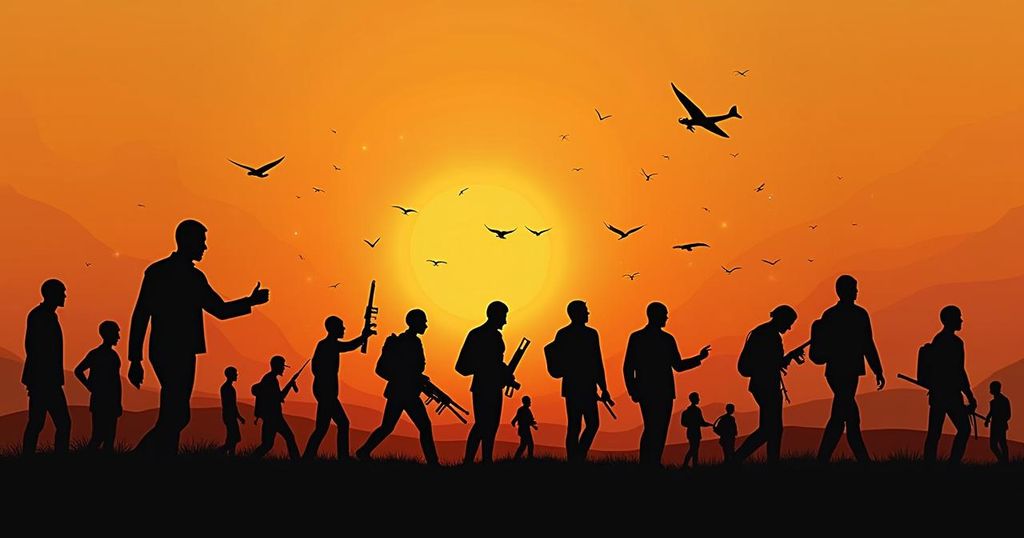The civil war in Sudan has escalated again with a recent offensive by the SAF against the RSF, resulting in over 20,000 deaths and millions displaced. Diplomatic efforts for ceasefire have failed, while regional implications remain dire due to the flow of refugees and ethnic tensions. A potential resolution appears unlikely without a change in international diplomatic efforts.
Recent developments in Sudan indicate a resurgence in violence, particularly following an offensive initiated by the Sudanese Armed Forces (SAF) against the paramilitary Rapid Support Forces (RSF) in late September. This renewed conflict, occurring eighteen months into the civil war, has escalated significantly, with organizations such as the United Nations reporting over 20,000 fatalities and approximately 10.9 million internally displaced individuals as of early October. The civil war, which is fundamentally a struggle for power between military factions led by General Abdel Fattah al-Burhan of the SAF and General Hamdan Dagalo of the RSF, has spread from Khartoum to various regions including Omdurman, Bahri, and the states of Darfur and Kordofan. While the RSF has established control in numerous areas, the SAF has intensified airstrikes and succeeded in regaining certain territories around Khartoum. The humanitarian situation remains dire, characterized by severe restrictions on aid and health care access, especially within Darfur. Moreover, the UN has declared famine in the Zamzam camp amid widespread food insecurity affecting over 25 million people in Sudan. The continuation of the conflict can be attributed to a variety of factors. Both factions remain entrenched, aiming to enhance their power and legitimacy. The SAF seeks recognition as the legitimate government despite its capture of power through a coup in 2021. Conversely, the RSF, which has territorial advantages, aims to contest this representation on international platforms. Additionally, despite an ongoing UN arms embargo since 2004, both sides have managed to procure weapons from external sources, with reports indicating the use of advanced military technology supplied by countries like China, Iran, and Russia. Furthermore, the war has taken on an ethnic dimension with regional militias joining the fray, escalating tensions particularly against non-Arab communities in Darfur. The conflict has been exacerbated by accusations of external support for both factions, which diminishes the likelihood of a swift resolution. Diplomatic efforts for ceasefire, perpetuated by the United States and Saudi Arabia, have consistently faltered, as both parties display little willingness to negotiate earnestly. The implications of the ongoing conflict extend beyond Sudan’s borders, with millions fleeing to neighboring countries such as Chad and South Sudan. These refugee situations heighten concerns within Europe regarding potential migration crises. Instabilities triggered by the civil war have also led to increased violence in border regions, notably the Abyei area between Sudan and South Sudan. Going forward, without significant changes in the approach of international actors, the conflict in Sudan is expected to prolong, with the possibility of regional fragmentation. The current situation indicates that the warring parties may resort to division akin to Somalia or Libya amid growing apathy from the international community as attention focuses on other global crises.
The civil war in Sudan, a conflict primarily between the SAF and RSF, initiated over power dynamics between the leaders of these military factions, has severely impacted the nation since its inception. With both parties competing for legitimacy and territorial control, the humanitarian situation has deteriorated to alarming levels, making it a critical issue both locally and internationally. The challenges faced in peace negotiations and the complex interplay of ethnic tensions and external military support continue to obfuscate pathways to resolution.
In conclusion, the civil war in Sudan exhibits no signs of abating, compounded by a myriad of factors including power rivalries, ethnic conflicts, and inadequate international intervention. The humanitarian crisis exacerbated by the ongoing violence poses significant challenges to stability in the region. Without reformed diplomatic approaches, the grim outlook for Sudan persists, as multiple ceasefire efforts have proven futile, suggesting that the conflict may extend for an indeterminate period, possibly leading to fragmentation similar to that seen in other conflict-ridden states.
Original Source: www.thehindu.com







